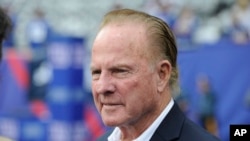The family of legendary American-style football player Frank Gifford says signs of the degenerative disease chronic traumatic encephalopathy were found in his brain after his death.
In a statement released Wednesday, the family said Gifford had "experienced firsthand" symptoms associated with C.T.E. but did not offer specifics. He died of natural causes at his Connecticut home.
"While Frank passed away from natural causes this past August at the age of 84, our suspicions that he was suffering from the debilitating effects of head trauma were confirmed" when C.T.E. was diagnosed, according to the statement.
C.T.E., a dementia-like disease linked to the types of brain injuries and head trauma common in football, can only be confirmed after death. Symptoms include aggressive behavior, depression, memory loss, progressive dementia and suicidal tendencies. Dozens of former NFL players have been posthumously diagnosed with the disease. In study results released earlier this year, 87 of 91 former NFL players who donated their brains to science after death tested positive for C.T.E.
Brain research
Gifford's family did not say who made the diagnosis or the severity of the disease, so it is hard to determine how the finding will impact the growing research on C.T.E. The family said it plans to have his brain studied "in hopes of contributing to the advancement of medical research concerning the link between football and traumatic brain injury."
The family also said it found "comfort in knowing that by disclosing his condition we might contribute positively to the ongoing conversation that needs to be had; that he might be an inspiration for others suffering with this disease that needs to be addressed in the present; and that we might be a small part of the solution to an urgent problem concerning anyone involved with football, at any level."
"His entire adult life, Frank was a champion for others, but especially for those without the means or platform to have their voices heard," the family statement said.
In a statement, NFL Commissioner Roger Goodell said the league supports grants related to government, university and independent efforts to research the effects of repetitive head trauma. The NFL has made a series of rule changes in recent years in an attempt to make the game safer.
"We appreciate the Gifford family's desire to help the medical community understand more about C.T.E., and we are grateful for their support of the league's efforts to improve safety in our game," Goodell said.
Star player
Gifford's diagnosis comes amid a growing focus on the risks athletes face from suffering repeated concussions, and just hours after the NFL admitted its concussion protocols had come up short when St. Louis Rams quarterback Case Keenum was allowed to stay in a game after receiving a hit to the head that caused a concussion.
Keenum was not fully examined until after the game ended.
Gifford, who played his entire career with the New York Giants from 1952 to 1964, is a member of the Pro Football Hall of Fame. A running back, defensive back, wide receiver and special teams player, he was the league's Most Valuable Player in 1956 when the Giants won the NFL championship.
But in one of the most iconic images in NFL history, Eagles linebacker Chuck Bednarik flattened Gifford with a crushing hit in a 1960 game and pumped his fist in celebration while standing over the unconscious Giants player. Gifford was hospitalized for 10 days and missed the 1961 season.
Gifford also enjoyed a celebrated career following retirement from the NFL. He served for 27 years as an announcer on ABC's "Monday Night Football" and worked for more than a decade alongside another famous broadcaster, the loquacious Howard Cosell.








